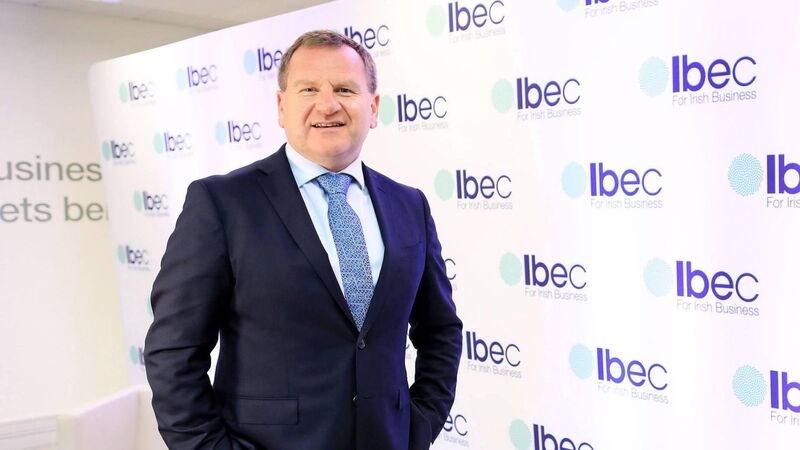Somebody needs to take the lead and right now it’s the followers who are in the lead position

Ibec Chief Executive Officer, Danny McCoy: I am passionate about the role of business in wider society as part of the sustainability push.
“I AM passionate about the role of business in wider society as part of the sustainability push, but also clearly in those two words you’ve got ‘sustainable’ and you’ve got ‘development’, and I think the developmental aspect probably is not getting as much airtime,” said Danny McCoy, chief executive of Ibec.
“Everybody is focussing in on sustainability, be that environmental sustainability or climatic more narrowly, or social fabric sustainability, democracy sustainability, a whole host of issues, but I think the driving passion for me is actually that the developmental piece should be the primary one, and that you do so sustainably. I think there’s a little bit of cart before the horse. We can sustain in un-developmental ways.
“We can stop doing things but that’s just not realistic. But a lot of people in their narrative are saying we’ve got to stop doing X, Y, and Z, and I think that business often suffers from that. There is a lot of knee-jerk reaction in society, and businesses need that resilience to keep going to fulfill their purpose. Sometimes those purposes can be quite narrow and that is alright. I don’t think that businesses are the instrument for solving everything. It has a very important role in society but too much is being loaded onto business, and sometimes business leaders encourage that through their narrative.
“Sometimes leadership is about saying no, this is not our role. My passion is to try and decipher some of those issues and not to throw the baby out with the bathwater. If we rationally and sustainably, but developmentally, look at how we could progress, that is where I think a lot of good things can come from, so that’s my driving passion. I think at this stage in my career I have quite a lot of experience and an analytical way of thinking.
“I have the platform to actually do that, both representing business but also an engagement with Government and wider society. I think there is a tendency now to think, they are my followers so therefore I must follow them, logic. Leadership is about leading your followers, not following your followers, and sometimes in paternalism, or maternalism or parenting, sometimes you need to say no for a greater, long-term sustainable future.”
Having served as chief economist for both the Economic and Social Research Institute (ESRI) and the Central Bank of Ireland before first joining Ibec in 2005, Danny also held a number of lecturing posts in universities including Oxford and Trinity College Dublin. Danny believes leadership has become more complex than ever.
“There is a coming together of intergenerational shifts occurring in terms of values. There is a generation who have actually grown up wealthy, and so notionally, I know it’s not that popular, but Maslow’s hierarchy of needs may not be a pyramid.
“But they are all interacting. This movement away from the basic shelter and nourishment, as you move up in terms of the higher levels of self-esteem and self-actualisation, there is a generation who actually positively enter the workforce now who have an expectation that they are in that top end of the Maslow hierarchy. They are talking about expression, esteem, actualisation because the basics are being looked after.
“However sometimes a challenge comes and you see societies that are being disrupted, like our Ukranian friends at the moment, and those very basic necessities of food, warmth, protection, shelter, company, become really challenged, and that is a leadership problem in terms of peoples values. We are going through that phase right now, you know, you tell me your values before I’ll join you, or I’ll leave you if you’re not reflecting my values.
“These are all very positive things if they are sustainable. There is a downturn coming. If those values survive that downturn, then I will be convinced. If I will work from home and I won’t come to the office because otherwise, I’ll leave you if that holds post an economic recession, then I’ll believe it’s the new normal, but right now I’m skeptical that people are confused a little bit by the circumstance.
“The macroeconomic circumstance is very artificial. It’s an exceptional period of time and so wage developments in the economy are way ahead of productivity. The economic cycle is always going to be there and so I worry that people are getting too much too soon and that there is going to be a whole load of societal problems as a result. I think that is now where leadership is required.
“It’s required to anchor expectations, and in using that analogy, I am not talking about trying to sink it. An anchor may have a sinking feeling, but an anchor is not designed to sink the boat. It is designed to stabilise it, and the length of the rope gives you some flexibility, but that anchoring anchors those expectations. I think that is what leadership is, to step up and be leaders and anchor expectations.
“Also anchoring expectations about what the hybrid world will look like and nobody knows the answers, but somebody needs to take the lead, and right now it’s the followers who are in the lead position. You don’t follow your followers. You lead your followers.”
Growing up in Tuam, Co Galway, Danny was passionate about economics, even as a child. Influenced by the current affairs programmes of the 1970s, including ‘Seven Days’ and even parodies such as ‘Halls Pictorial Weekly’, he would hear people talking about T.K. Whitaker, and about the economics of the time and knew it was important, and so he was attracted to it.
“I was very fortunate then, with that passion, I went on and did Commerce, because I didn’t think you would get a job as an economist. I was very fortunate to be able to get a career in economics and because I lectured early on I could communicate it, I think a little bit better than most.
“It’s like the weather, the economy is happening all the time. So, you just ask people, similar to what’s the weather like, how’s business?
“They will tell you one piece of information and then you will quickly see that there is a price and a quantity in what they say, and you’ve got a hook. They’ll say.. ‘it’s very hard to get staff’, well that’s quantity, or ‘it’s hard to get paid’, that’s the price.
“So economics just opens up a conversation, and if you can master it in a way that’s communicable, you can really make a difference in changing people’s perspectives about things, and re-framing problems.
“So I think careerwise, that route of economics has been hugely important to me, and the application of that has been in environmental economics, although I’m not an environmentalist. I believe in a technocentric view of the world. I believe technology will push back the boundaries, so there has to be a balance, a risk return trade-off, and that’s what economics is about.
“It is about allocating resources to meet targets, but those resources, when they are used in one way are not available to do something else, so if to govern is to choose, then economics is the analytical framework in which to utilise that. I guess that’s what drives me on.
“I don’t want to be a politician, but I certainly believe that I have a role in Irish society that is equally significant and doesn’t have the vagrancies of an electorate. That is why I have had longevity in my career.”

Reflecting further on his career and the skills and attributes he considers important in the workplace today, Mr McCoy said: “I think temperament is actually the most important attribute I have seen in colleagues, in any context. Having been through academic institutions, you can have brilliant people, but if their temperament means that they are unworkable, fundamentally they are useless and have no impact. And a lot of that goes down to temperament and affability, and I think capacity.
“With temperament, you can get lots of things done because you can work together. So good temperament is what I have learned through life. Everything else can be compensated for. Expertise can be bought in.”
Today, April 29, is National Workplace Wellbeing Day, initially launched by Ibec in 2015. Its purpose is to encourage businesses across Ireland, to not only mark on a given day the importance of wellbeing across organisations, but to develop continuous multi-annual programmes to achieve those outcomes.
Mr McCoy recalls its origins: “Back in 2006, as an economist here in Ibec, I did quite a lot of papers on the fact that at any given moment in time a certain percentage of employees are going through mental anguish in the workplace.
“If there was a percentage of your machines not functioning, as a manager you should know about that, and so likewise you should know if your colleagues are going through something that you can be helpful with, again respecting boundaries.
“Of course, that’s important to others also because they know that if you are supportive, you will be supportive of them in their moment because all of us will have some moments in our life cycle to various degrees, where we need that support.
“So I think businesses should come at this probably from that sterile way that I’m coming from, not the happy, clappy, I want to know about your stuff, just genuinely to say, my job is to run the organisation. We want to be helpful here.
“Not that we want to be helpful because you are you, that’s inauthentic.
“The authentic aspect is to say, the reason why we want to intervene is that we want you to get back to your full potential, because your full potential is in our interest, in this space that we call work.”
In wishing Mr McCoy well and querying his vision for the future, he concluded:
“I am very seized by the opportunity that Ireland has right now. As a generation of Irish people we have never lived in a better time on all dimensions, and that’s exciting for a reversal of our fortunes.
“Ireland’s moment has come in this generation, and it would be a tragedy if we didn’t utilise the resources to build, not a nouveau riche society but a better, sustainable one.”
Mary Cummins is a career and executive coach. She can be contacted on 087 8290207 or via her website Careerchanger.ie.







 App?
App?




